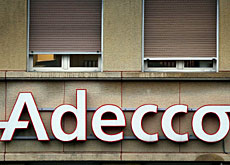Auditors want more state intervention

Switzerland’s big auditing firms want the government to introduce tighter controls similar to those already in place in the United States.
The desire for greater transparency follows a series of financial scandals from Enron to Parmalat that have highlighted dubious accounting practices.
Last month it was the turn of the Swiss employment agency, Adecco, to own up to accounting irregularities.
Shares in the global industry leader plunged by a third as the company, based in Glattbrugg near Zurich, was forced to delay publishing its 2003 results.
Poor strategies, shrinking markets and fraudulent management have all played a part as the likes of Enron, WorldCom and now Parmalat have imploded into the financial black holes in their balance sheets.
But often there has also been an element of incomplete or lax auditing, reflecting a concern to please the client.
“In any case, the control mechanisms have not worked as they should have done,” said Rudolf Strahm, a Social Democrat parliamentarian who is an expert on financial issues.
“And if the auditing is not of the very highest standard, manipulation is always possible.”
New measures
In the midst of the growing concern over financial practices, the European Commission is calling for companies to rotate auditors to reinforce their independence.
Commission sources says auditor rotation will be among the measures announced by Brussels in March as part of a large-scale shake up of the profession.
In addition, on Tuesday, the Italian government put forward a draft law aimed at preventing financial fraud, in a bid to restore confidence after the Parmalat crisis.
The Italian foreign minister, Franco Frattini, said the bill includes giving the country’s competition regulator shared veto powers with the Bank of Italy over banking mergers. It does not, however, increase prison sentences for financial fraud.
US takes the lead
But it was the US which took the lead in tightening its financial controls. Shaken by the Enron affair, the US government rushed through new legislation in 2002 in the form of the Sarbanes-Oxley Act.
Its main provisions include: government accreditation procedures; annual inspections for the big auditing houses; and the principle that auditors must be independent.
Firms are now prohibited from performing other functions, such as consulting or marketing, for the companies whose accounts they scrutinise.
The legislation also applies to foreign auditing companies operating on US soil, as well as firms which are hired to certify the accounts of US subsidiaries in other countries.
“The major Swiss auditing companies therefore asked us to intervene,” said Heinrich Koller, director of the Federal Office of Justice.
“Otherwise, they would no longer have been able to work in the US or with American companies in Switzerland.”
Their request was for standards similar to those introduced in the US to be applied in Switzerland.
Sense of urgency
Following an accelerated process, the cabinet is expected to present a draft of the new law to parliament in March.
The legislation provides for more rigorous supervision, an obligation to rotate auditors, and the separation of consultancy work from auditing.
“The big auditing firms will have to obtain a licence from the state, be registered and submit a whole series of documents each year,” explained Koller.
According to Koller, Washington has approved the safeguards being put in place in Switzerland.
“Therefore, until 2007, they will not be implementing any controls in Switzerland.”
Rising pressure
The Social Democrats have been calling for some time for the government to get a tighter grip on auditing firms.
“Well in advance of the US legislation, I had made various proposals to parliament of this kind,” Strahm told swissinfo.
“But I would never have dared to go so far. This amounts to full-scale supervision on the part of the state.”
According to Strahm, the new law has been drafted too hurriedly and compromises auditors’ independence.
“The consultation procedure was rushed through and not all the problems have been ironed out. Some of the auditing companies are most unhappy. The bill’s passage through parliament will be a long one.”
Unlike the big corporations, which are totally in favour of new legislation, small and medium-sized auditing firms fear an increase in red tape, with very few real benefits.
But Strahm maintains that stricter regulation is inevitable, given that auditing remains a task of fundamental and ethical importance.
“The auditing company is the most important body in this respect, far more so than the board of directors,” he said. “It is the only body which has the company accounts under close scrutiny for a period of weeks. The directors meet only a few times each year.”
swissinfo
Swiss auditing companies have requested that standards similar to those introduced in the US be applied in Switzerland.
The legislation provides for more rigorous supervision, an obligation to rotate auditors, and the separation of consultancy work from auditing.
In the aftermath of the Enron affair, the US government rushed through new legislation in 2002 in the form of the Sarbanes-Oxley Act.
Meanwhile, the Italian government has put forward a draft law aimed at preventing financial fraud, in a bid to restore confidence after the Parmalat crisis.

In compliance with the JTI standards
More: SWI swissinfo.ch certified by the Journalism Trust Initiative










You can find an overview of ongoing debates with our journalists here . Please join us!
If you want to start a conversation about a topic raised in this article or want to report factual errors, email us at english@swissinfo.ch.